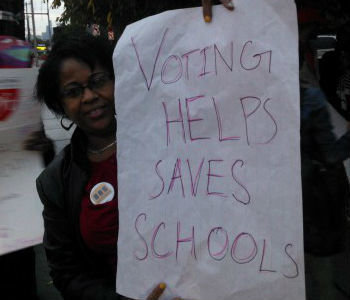
by City Commissioner of Philadelphia Stephanie Singer
How do you measure the importance of an election contest? Count how much money is spent? How many TV commercials you’ve seen? How many articles and blogs talk about the contest? By these measures, Governor is the most important contest on the Pennsylvania ballot this year, along with the races for US Congress.
If you measure by the number of people involved in passing petitions and the number of court challenges, you might come to a different conclusion. On March 11 there was a scene in City Hall that probably won’t be equalled for another four years — the crowd of candidates submitting nomination petitions for election to their local Democratic and Republican ward committees. My office had one of its busiest and happiest days as candidates stopped by to show us their signed petitions and signature receipts.
 Not tens, not hundreds, but thousands of Philadelphians are running for these micro local party offices. There will be tens, if not hundreds, of court cases fought before the ballots are finalized.
Not tens, not hundreds, but thousands of Philadelphians are running for these micro local party offices. There will be tens, if not hundreds, of court cases fought before the ballots are finalized.
Why the fuss? These positions don’t come with salaries, staff or even a desk. Committee People in Philadelphia (as the members of the party ward committees are often called) are expected to work hard organizing their neighbors politically. And while they do typically receive some money around Election Day, it’s not enough to explain the hullabaloo or the lawyers’ fees. So why the fuss?
An effective Committee Person has the power to influence her neighbors’ votes and, as a consequence, to demand attention from elected officials more effectively than a single citizen speaking for herself. But this power is due to the relationships the Committee Person maintains, not due to the title. A person could choose to do that work and reap that reward without ever officially running. So why the fuss about these elections?
Here’s the key power of an elected Committee Person: to cast a vote for Ward Leader. Shortly after the May 20 election, each elected Committee Person will be invited to a meeting with all the Committee People from the same party and the same ward — a group of about 30-60 people usually — to choose one Ward Leader. And Ward Leaders have a lot of power within the Philadelphia Democratic and Republican Parties. Ward Leaders alone vote for the Chairman and Treasurer of the parties. Ward Leaders alone decide who will be put on the ballot in a special election. Ward Leaders alone decide how much patronage will be paid to whom within their wards.
Most of the time, it’s the Ward Leaders who have power over the Committee People. Once every four years, the Committee People have power over the Ward Leaders. That time is now. That’s why the fuss.
In just the same way, it’s only once every four years that the voters have power over the Committee People — in the May 20 Primary Election, where voters who are registered as Democrats or Republicans vote for Committee People. Between now and then, one key question to ask the candidates for Committee Person in your neighborhood is whom they support for Ward Leader and why.
–
Leave a Reply